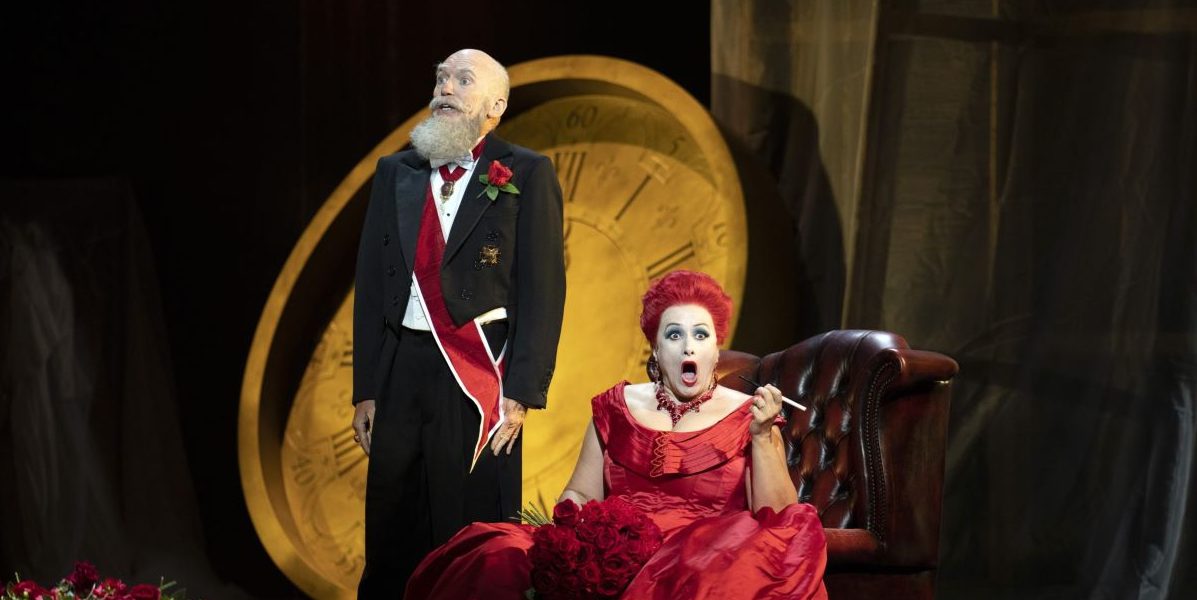The brand new production by the Welsh National Opera of Janáček penultimate opera, The Makropulos Affair, is, quite simply, a brilliant, flawless presentation of a masterpiece.
Angeles Blancas Gulin, who takes on the central role of the great soprano Emilia Marty, is a convincing, moving and ultimately tragic embodiment of this magical character who finally achieves a redemptive realisation of the futility of her long life. The difficult, innovative score is brilliantly presented by the entire cast with everyone in top form both musically and dramatically.
The work itself brings together seamlessly all the arts needed for one of the ultimate, satisfying evenings of music theatre and the Welsh National Opera production fulfils every demand of the opera.
Ultimately the success of this evening is, of course, the usual team effort of the Welsh National Opera, blending the considerable talents of the director Olivia Fuchs, the designer Nicola Turner, the Lighting designer Robbi Butler and the creator of the videos, Sam Sharples. All should be given unreserved praise for their response to this work of mystery and magical realism. But ultimately Tomas Hanus, the conductor, is the creative pivot of the whole, eliciting from his instrumentalists and his singers every aspect of that marvellously astringent, slightly awkward yet utterly lyrical score, uniting stage and orchestra in a seamless presentation of Janacek’s work of genius.
Janáček adapted the play by Karel Capek himself and his musical line follows as much as possible the actual rhythms of the dialogues and the important speeches, so that the score comes together mostly through a series of motifs. The experience of this opera is a rich one. The story is so strong, the details you need to understand at times so complex, that you need to follow the dialogue closely to understand what is unfolding. And yet, simultaneously, the orchestral contribution is so rich and gorgeous, often so lyrical and involving, that it is also drawing you to concentrate on the music. This is a complex, sophisticated and exceptionally thought-provoking work.
The original play was inspired as Capek’s rebuttal to George Bernard Shaw’s Back to Methuselah. Both writers were reacting as something like seers to the destructive atrocities of World War I and the technological advances of the earlier part of the century and each was prefiguring a different future for humanity. The angst and hope of the Capek approach is completely embodied in Janacek’s score.
In the performance that I saw Nicky Spence was a fine Albert Gregor, Harriet Eyley had shining moments as Krista, Alexander Sprague was deeply appealing and touching as Janek, and Alan Oke particularly striking and hilarious as Count Hauk-Sendorf. Every single performer had a standout moment.
But the towering performance that binds it all together is, of course, the mercurial Angeles Blancas Gulin realizing brilliantly all the demands of this astonishing role. Her acting, her declamations, her complete mastery of every moment and her ultimate lyrical denouement are spell binding throughout. The interpretations of all the singers and all the creatives mesh together so truthfully because they are led with total strength and grace by conductor Tomas Hanus. Experiencing an evening such as this by the WNO makes me all the more upset about the blinkered inability of the Arts Council to understand the damage they are causing by cutting funding to centres of excellence. Unlike the outdated economic thinking of our leaders, this kind of talent and artistry actually does trickle down and inform aspiring creatives of all kinds and is respected throughout the world.

